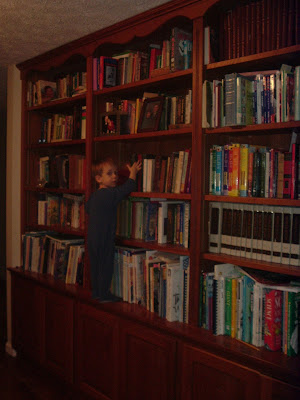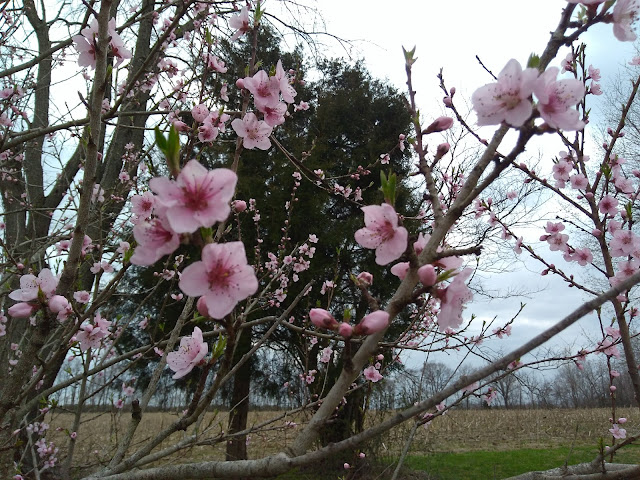Building a Home Library
Caught! Toddler Ben helps himself to a book from our front hall shelves.
I'm not sure our house has any unified theme in home decor, but if you had to pick a style maybe you could call it "Early Library." Bookshelves fill almost every room, excepting the laundry room, dining room, and bathrooms. So when I picked up The Little Bookroom by Eleanor Farjeon from the "Classics" shelf at our library, I was intrigued to read this introductory note:
I read more of Miss Farjeon's untraditional life in Who Should We Then Read? Born in England in 1881, Nell, as she was called, was a poet and children's author. Papa Farjeon did not want his children to have a typical formal education, but instead encouraged them to read from the 8000 volume home library. Every Sunday he gave each of his four children a new book. Not only that, but Papa Farjeon made a practice of not only reading to his children regularly, but also presenting slide shows with the slides in the wrong order to encourage them to create their own stories. He kept the best results in a book, and little Eleanor was drafting her own tales by the time she was six. Her father, a former news reporter, then taught her to type (in the 1880's!) and edit. Miss Farjeon's books have fallen out of favor these days, but you probably know the poem/song for which she is most famous: "Morning Has Broken".
Literature has the power not only to nourish the imagination, as Miss Farjeon describes in the rest of her introduction to The Little Bookroom, but to teach character, expand horizons, bring history to life, and so much more. Reading aloud, as Mr. Farjeon knew, does indeed prepare children to write and also can go a long way in building a common family culture. When my children play Pooh Sticks (racing sticks under a bridge) or talk about someone as Puddleglum, no one needs an explanation because we've shared Winnie the Pooh and Lewis's The Silver Chair together.
But why should we bother to build a home library when most of us have access to public libraries? I’m a big fan of libraries in general, our local library in particular, and our bookmobile, “Paige”, driven by our beloved librarian Shawn in most particular. It is so wonderful to be able to choose books from the online catalog and then find the titles delivered the next Monday when the green van makes her way to our neck of the woods. When our roads are too icy or snowy for Paige to make it up the steep hills, Shawn calls to let us know they won’t be there. There have even been times when I’ve told Shawn what we are studying and the next week she brings specially chosen books for us.
But as much as I appreciate the public library, it can’t compare with having constant and ready access to a large selection of personally chosen books at home. In case you need a few more reasons to spend the time and money necessary to develop your own library, here are a few:
1.We want our children to be word rather than image oriented. God spoke to us through His Word, not through pictures or videos. Encouraging reading develops this word orientation, while screen time does the opposite. A house filled with books fosters this goal.
2. Libraries have to cater to a wide reading audience, and, sadly, succumb to some of the often inane trends in publishing such as the grossology books. In your personal library, you can sift through titles, in and out of print, to choose only those titles which will be truly excellent and profitable for your family.
3. Ready access to reference materials such as identification guides and dictionaries allows you to take advantage of teachable moments, whether it is to discover the name of the bird that just visited your feeder or the derivation of an unusual word. Great reference books to own include identification books (birds, trees, insects, and wildflowers top my most important), a good dictionary and thesaurus, foreign language dictionaries, and atlases.
4. You can’t beat the convenience of having the books you need already in your possession, especially if you are homeschooling. For me, the time savings more than makes up for the expense, particularly since we reuse so many books again and again.
5. When you have lots of books and several kids, you will start to notice older ones pulling books off shelves and saying to a sibling, “You have to read this! This was one of my favorite books when I was your age!” (I’ve been noticing this happening during Thanksgiving break.)
6. Nothing builds a love of learning more than easy access to great books. In fact, there is a very high correlation between the number of books in a home and the education level of children. In a fascinating long term study that looked at the size of a home library and the education of parents and children in several different countries across the globe, researchers found the number of books outweighs other factors.
7. And don’t forget – books are a terrific way to decorate a home!
Coming next: But how do you choose good quality books?
I'm not sure our house has any unified theme in home decor, but if you had to pick a style maybe you could call it "Early Library." Bookshelves fill almost every room, excepting the laundry room, dining room, and bathrooms. So when I picked up The Little Bookroom by Eleanor Farjeon from the "Classics" shelf at our library, I was intrigued to read this introductory note:
In the home of my childhood there was a room we called "The Little Bookroom". True, every room in the house could have been called a bookroom. Our nurseries upstairs were full of books. Downstairs my father's study was full of them. They lined the dining room walls, and overflowed into my mother's sitting-room, and up into the bedrooms. It would have been more natural to live without clothes than without books. As unnatural not to read as not to eat.
I read more of Miss Farjeon's untraditional life in Who Should We Then Read? Born in England in 1881, Nell, as she was called, was a poet and children's author. Papa Farjeon did not want his children to have a typical formal education, but instead encouraged them to read from the 8000 volume home library. Every Sunday he gave each of his four children a new book. Not only that, but Papa Farjeon made a practice of not only reading to his children regularly, but also presenting slide shows with the slides in the wrong order to encourage them to create their own stories. He kept the best results in a book, and little Eleanor was drafting her own tales by the time she was six. Her father, a former news reporter, then taught her to type (in the 1880's!) and edit. Miss Farjeon's books have fallen out of favor these days, but you probably know the poem/song for which she is most famous: "Morning Has Broken".
Literature has the power not only to nourish the imagination, as Miss Farjeon describes in the rest of her introduction to The Little Bookroom, but to teach character, expand horizons, bring history to life, and so much more. Reading aloud, as Mr. Farjeon knew, does indeed prepare children to write and also can go a long way in building a common family culture. When my children play Pooh Sticks (racing sticks under a bridge) or talk about someone as Puddleglum, no one needs an explanation because we've shared Winnie the Pooh and Lewis's The Silver Chair together.
But why should we bother to build a home library when most of us have access to public libraries? I’m a big fan of libraries in general, our local library in particular, and our bookmobile, “Paige”, driven by our beloved librarian Shawn in most particular. It is so wonderful to be able to choose books from the online catalog and then find the titles delivered the next Monday when the green van makes her way to our neck of the woods. When our roads are too icy or snowy for Paige to make it up the steep hills, Shawn calls to let us know they won’t be there. There have even been times when I’ve told Shawn what we are studying and the next week she brings specially chosen books for us.
But as much as I appreciate the public library, it can’t compare with having constant and ready access to a large selection of personally chosen books at home. In case you need a few more reasons to spend the time and money necessary to develop your own library, here are a few:
1.We want our children to be word rather than image oriented. God spoke to us through His Word, not through pictures or videos. Encouraging reading develops this word orientation, while screen time does the opposite. A house filled with books fosters this goal.
2. Libraries have to cater to a wide reading audience, and, sadly, succumb to some of the often inane trends in publishing such as the grossology books. In your personal library, you can sift through titles, in and out of print, to choose only those titles which will be truly excellent and profitable for your family.
3. Ready access to reference materials such as identification guides and dictionaries allows you to take advantage of teachable moments, whether it is to discover the name of the bird that just visited your feeder or the derivation of an unusual word. Great reference books to own include identification books (birds, trees, insects, and wildflowers top my most important), a good dictionary and thesaurus, foreign language dictionaries, and atlases.
4. You can’t beat the convenience of having the books you need already in your possession, especially if you are homeschooling. For me, the time savings more than makes up for the expense, particularly since we reuse so many books again and again.
5. When you have lots of books and several kids, you will start to notice older ones pulling books off shelves and saying to a sibling, “You have to read this! This was one of my favorite books when I was your age!” (I’ve been noticing this happening during Thanksgiving break.)
6. Nothing builds a love of learning more than easy access to great books. In fact, there is a very high correlation between the number of books in a home and the education level of children. In a fascinating long term study that looked at the size of a home library and the education of parents and children in several different countries across the globe, researchers found the number of books outweighs other factors.
7. And don’t forget – books are a terrific way to decorate a home!
Coming next: But how do you choose good quality books?



Comments